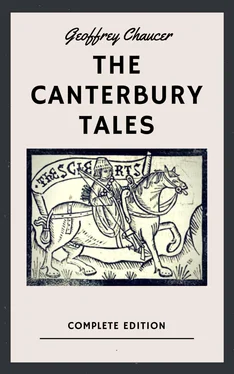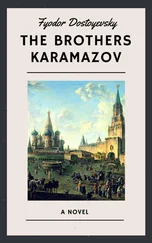5. The Saintes Legend of Cupid: Now called "The Legend of Good Women". The names of eight ladies mentioned here are not in the "Legend" as it has come down to us; while those of two ladies in the "legend" — Cleopatra and Philomela — are her omitted.
6. Not the Muses, who had their surname from the place near Mount Olympus where the Thracians first worshipped them; but the nine daughters of Pierus, king of Macedonia, whom he called the nine Muses, and who, being conquered in a contest with the genuine sisterhood, were changed into birds.
7. Metamorphoseos: Ovid's.
8. Hawebake: hawbuck, country lout; the common proverbial phrase, "to put a rogue above a gentleman," may throw light on the reading here, which is difficult.
THE TALE. <1>
O scatheful harm, condition of poverty,
With thirst, with cold, with hunger so confounded;
To aske help thee shameth in thine hearte;
If thou none ask, so sore art thou y-wounded,
That very need unwrappeth all thy wound hid.
Maugre thine head thou must for indigence
Or steal, or beg, or borrow thy dispence*. *expense
Thou blamest Christ, and sayst full bitterly,
He misdeparteth* riches temporal; *allots amiss
Thy neighebour thou witest* sinfully, *blamest
And sayst, thou hast too little, and he hath all:
"Parfay (sayst thou) sometime he reckon shall,
When that his tail shall *brennen in the glede*, *burn in the fire*
For he not help'd the needful in their need."
Hearken what is the sentence of the wise:
Better to die than to have indigence.
*Thy selve* neighebour will thee despise, *that same*
If thou be poor, farewell thy reverence.
Yet of the wise man take this sentence,
Alle the days of poore men be wick'*, *wicked, evil
Beware therefore ere thou come to that prick*. *point
If thou be poor, thy brother hateth thee,
And all thy friendes flee from thee, alas!
O riche merchants, full of wealth be ye,
O noble, prudent folk, as in this case,
Your bagges be not fill'd with *ambes ace,* *two aces*
But with *six-cinque*, that runneth for your chance;<2> *six-five*
At Christenmass well merry may ye dance.
Ye seeke land and sea for your winnings,
As wise folk ye knowen all th' estate
Of regnes*; ye be fathers of tidings, *kingdoms
And tales, both of peace and of debate*: *contention, war
I were right now of tales desolate*, *barren, empty.
But that a merchant, gone in many a year,
Me taught a tale, which ye shall after hear.
In Syria whilom dwelt a company
Of chapmen rich, and thereto sad* and true, *grave, steadfast
Clothes of gold, and satins rich of hue.
That widewhere* sent their spicery, *to distant parts
Their chaffare* was so thriftly** and so new, *wares **advantageous
That every wight had dainty* to chaffare** *pleasure **deal
With them, and eke to selle them their ware.
Now fell it, that the masters of that sort
Have *shapen them* to Rome for to wend, *determined, prepared*
Were it for chapmanhood* or for disport, *trading
None other message would they thither send,
But come themselves to Rome, this is the end:
And in such place as thought them a vantage
For their intent, they took their herbergage.* *lodging
Sojourned have these merchants in that town
A certain time as fell to their pleasance:
And so befell, that th' excellent renown
Of th' emperore's daughter, Dame Constance,
Reported was, with every circumstance,
Unto these Syrian merchants in such wise,
From day to day, as I shall you devise* *relate
This was the common voice of every man
"Our emperor of Rome, God him see*, *look on with favour
A daughter hath, that since the the world began,
To reckon as well her goodness and beauty,
Was never such another as is she:
I pray to God in honour her sustene*, *sustain
And would she were of all Europe the queen.
"In her is highe beauty without pride,
And youth withoute greenhood* or folly: *childishness, immaturity
To all her workes virtue is her guide;
Humbless hath slain in her all tyranny:
She is the mirror of all courtesy,
Her heart a very chamber of holiness,
Her hand minister of freedom for almess*." *almsgiving
And all this voice was sooth, as God is true;
But now to purpose* let us turn again. *our tale <3>
These merchants have done freight their shippes new,
And when they have this blissful maiden seen,
Home to Syria then they went full fain,
And did their needes*, as they have done yore,* *business **formerly
And liv'd in weal*; I can you say no more. *prosperity
Now fell it, that these merchants stood in grace* *favour
Of him that was the Soudan* of Syrie: *Sultan
For when they came from any strange place
He would of his benigne courtesy
Make them good cheer, and busily espy* *inquire
Tidings of sundry regnes*, for to lear** *realms **learn
The wonders that they mighte see or hear.
Amonges other thinges, specially
These merchants have him told of Dame Constance
So great nobless, in earnest so royally,
That this Soudan hath caught so great pleasance* *pleasure
To have her figure in his remembrance,
That all his lust*, and all his busy cure**, *pleasure **care
Was for to love her while his life may dure.
Paraventure in thilke* large book, *that
Which that men call the heaven, y-written was
With starres, when that he his birthe took,
That he for love should have his death, alas!
For in the starres, clearer than is glass,
Is written, God wot, whoso could it read,
The death of every man withoute dread.* *doubt
In starres many a winter therebeforn
Was writ the death of Hector, Achilles,
Of Pompey, Julius, ere they were born;
The strife of Thebes; and of Hercules,
Of Samson, Turnus, and of Socrates
The death; but mennes wittes be so dull,
That no wight can well read it at the full.
This Soudan for his privy council sent,
And, *shortly of this matter for to pace*, *to pass briefly by*
He hath to them declared his intent,
And told them certain, but* he might have grace *unless
To have Constance, within a little space,
He was but dead; and charged them in hie* *haste
To shape* for his life some remedy. *contrive
Diverse men diverse thinges said;
And arguments they casten up and down;
Many a subtle reason forth they laid;
They speak of magic, and abusion*; *deception
But finally, as in conclusion,
They cannot see in that none avantage,
Nor in no other way, save marriage.
Then saw they therein such difficulty
By way of reason, for to speak all plain,
Because that there was such diversity
Between their bothe lawes, that they sayn,
They trowe* that no Christian prince would fain** *believe **willingly
Wedden his child under our lawe sweet,
That us was given by Mahound* our prophete. *Mahomet
And he answered: "Rather than I lose
Constance, I will be christen'd doubteless
I must be hers, I may none other choose,
I pray you hold your arguments in peace,<4>
Save my life, and be not reckeless
To gette her that hath my life in cure,* *keeping
For in this woe I may not long endure."
What needeth greater dilatation?
I say, by treaty and ambassadry,
And by the Pope's mediation,
And all the Church, and all the chivalry,
That in destruction of Mah'metry,* *Mahometanism
And in increase of Christe's lawe dear,
They be accorded* so as ye may hear; *agreed
How that the Soudan, and his baronage,
Читать дальше












